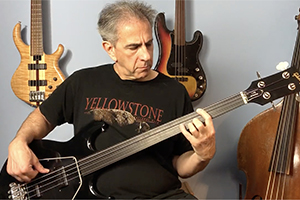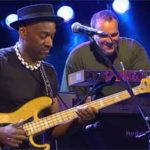Assessing what you want, versus what you need in an instrument
By Jon Liebman
Week of October 7, 2019
It’s always fun catching up with former Pantera bassist Rex Brown to talk about whatever music projects he’s working on. In this week’s FBPO interview, Rex provided all kinds of details about the new solo album he’s got in the works, the follow-up to his 2017 release, Smoke on This. The conversation included a rundown of the recording process, choice of gear, music selection, and Rex’s resolve to “never make the same record twice.”
When we talked about all the different theories about how to approach the bass, I asked Rex what advice he could impart to anyone who wants to learn to play bass. The first thing he advised was to think back to your first memory of noticing – and appreciating – the bass line in your favorite song, then learning to play that line. In other words, play something that’s enjoyable to you. He also covered some nuts and bolts elements, like scales, articulation, and proper plucking technique.
One thing he said that got my attention was his suggestion that adult learners should start out with an inexpensive bass, comparable to what a 13- or 14-year-old student would use, even though they could probably afford a higher quality instrument.
Does that really matter?
I’ve played some very expensive basses, and I’ve played some pretty cheap ones. Yes, for the most part, there is a difference (I imagine a $1,000 bottle of wine must be pretty special too, but so far I can’t tell you first-hand). With a bass, it comes down to things like quality craftsmanship, ease of playing, and overall sound. It also comes down to necessity, weighing what you want against what you need.
In most cases, even an inexpensive bass can get the job done, as long as everything works. At the end of the day, it comes down to the player. A great bassist will still sound pretty good on a low-budget instrument, whereas a mediocre player won’t be helped much at all, even with a top of the line bass, boasting precisely calibrated features, a gorgeous paint job, and over-the-top electronics.
I cover this subject to some degree in my bass books that include an appendix on equipment and effects (specifically, Funk Bass and Rock Bass).
If you’re a member of the FBPO bass school, you can start out with an inexpensive instrument, or you can go all out with the latest and greatest bass you can find. Members are encouraged to reach out to me anytime with questions or concerns regarding bass-playing issues, including choosing an instrument. I’m always happy to help.
Whatever you decide, don’t lose sight of what’s most important in playing the bass, which is to groove with a great time feel. If you can’t learn do that on your chosen instrument, even the “greatest” bass in the world won’t help.
Have a thought on the subject? Leave a comment below. I’d love to know what you think. In the meantime, check out my interview with Rex here.






I have a small collection of Bass Guitars in my home ,but I recently just bought a real cheap one for under $300.A Yamaha TRB174.Its pretty basic but I managed to get a great tone out of it without twiddling about with the knobs to get a decent sound like I do with my other more expensive Basses.I just practically plug in and play with the minimal knob adjustment.Mind you Yamaha are making really good sounding Basses that don’t cost an arm and a leg.
Hi Jon,
My thoughts differ somewhat on the matter, though I also acknowledge that a person only has as much to spend as they have. I advise people to focus first on instrument quality and to reach just beyond what they think of as ‘the most expensive’ instrument they can afford. Learning to play is challenging enough; to put yourself in a position where you’re also fighting with a junk instrument is adding an element of difficulty you’re better off without.
Another perspective … I worked in a retail shop for a while. We sold a lot of high-end guitars and basses (more guitars though) to guys who, well, um, let’s just say they should have spend that money on lessons.
A decent inexpensive instrument will make it possible for a dedicated person to learn and do well. A very expensive instrument affords them the opportunity to endlessly play with this or that setting of a myriad of knobs and switches, or to fuss with strings and different kinds of frets: things that don’t have much impact on your actual playing ability.
I’m in the “inexpensive is good to start” camp. But I stipulate to what Tomm has said, I don’t mean you should fight against a ‘junk’ instrument just because it doesn’t cost much. The hidden cost there is that you decide you hate playing or can’t play (when probably you can).
At last count, I’ve owned a little over 30 basses in my career and they’ve covered the spectrum from a $110 Lotus 4 String to Custom Ken Smiths, Brubakers and Warriors, and EVERYTHING in between. Jon is absolutely right. Find a bass that feels right and produces the sound you hear in your head. And once you find it, NEVER LET IT GO. Regardless of what “everybody’s playing” or what your favorite bassist is playing, find the bass that offers the most direct route from the music in your mind to the ears of your audience. One of the baddest players I know makes INCREDIBLE music on the same 70’s Ibanez Jazz Bass he first learned to play on…30 years ago. Right now, my Ken Smith and Brubaker have been sitting in their cases since I got my Sire M7 5 string…almost 2 years ago.